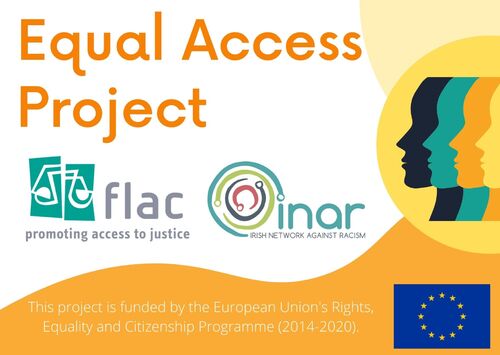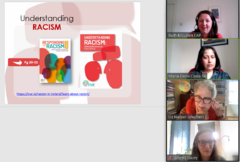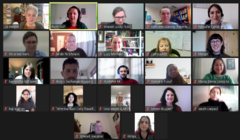The Equal Access Project (EAP) aims to improve access to justice for people who experience racial discrimination in employment or in accessing goods and services. The INOU has played a crucial role in supporting the delivery of this project’s objectives through the provision of innovative and critically-needed advocacy training.
The EAP is an EU-funded initiative of FLAC (Free Legal Advice Centres) and INAR (Irish Network Against Racism). It arose as a response to the crisis in access to justice for people who experience discrimination on the basis of their race or ethnicity, including membership of the Traveller Community. These cases are dealt with in the Workplace Relations Commission, a fact that comes as a surprise to most people, and for good reason. If your local butcher refused to serve you, using racially charged language as they threw you out of their shop, would you know that the place for you to seek legal redress for this discrimination is the Workplace Relations Commission? This is often the first barrier for victims of this kind of discrimination; finding information about what they can do about it and where to make a complaint.
Since its inception in 2015, there has been a consistently low number of race discrimination complaints made to the WRC. Cases of discrimination against Travellers in employment reached a peak in 2021 of just 20 complaints, while the number of cases of racial discrimination in access to goods and services has fallen drastically from 465 in 2016 to just 85 in 2021. This suggests a collapse of confidence among affected individuals in the WRC as an effective mechanism to resolve their complaint.
This situation is exacerbated by the low success rate for complainants. Even when cases are successful, monetary compensation is limited and may be negated by the cost of engaging legal representation to take the case. Analysis of these cases shows that ‘inequality of arms’ is an important factor in the success or failure of a case. When complainants represent themselves against an employer who has legal representation in the form of solicitors or barristers, they are at a disadvantage. Legal Aid is not currently available for complaints before the WRC, so complainants who cannot afford a solicitor are left to represent themselves, or rely on the services of an advocate. There is clearly a need for more advocates who have the knowledge and skills required to give information and advice to someone who has been discriminated against, and to accompany complainants through the often complicated, confusing, and intimidating process of taking a case.
In collaboration with the INOU, FLAC and INAR have developed an Anti-Racism Advocacy training programme, which was delivered for the first time in 2022. Participants in the pilot programme came from backgrounds in advocacy, law, healthcare, anti-racism activism, community development, education, and social work. The programme covered a range of topics. These were designed to expand the trainees’ knowledge of areas like relevant national and EU legislation, models of equality, and advocacy ethics. Development of practical advocacy skills was emphasised, including the skills involved in presenting the case to the Adjudication Officer, and step-by-step guidance to navigating WRC processes like filling out the official complaint form. Enhancing the trainees’ capacity to understand and respond to racism was central to the training programme, and the participants benefited from learning about each other’s experiences, both personal and professional.
The trainees who completed their assessments earned 15 credits leading to a Level 6 QQI award in Information, Advice, and Advocacy Practice. The provision of nationally accredited training is crucial to developing the capacity of advocates working to uphold the rights of minoritised communities across Ireland through effective advocacy.
FLAC and INAR expect to publish a major research report into the effectiveness of Ireland’s infrastructure for dealing with discrimination on the race and Traveller community ground over the coming months. In addition, both organisations are presently engaging with stakeholders to seek support for the delivery of this training programme in the future after the EAP is finalised.



